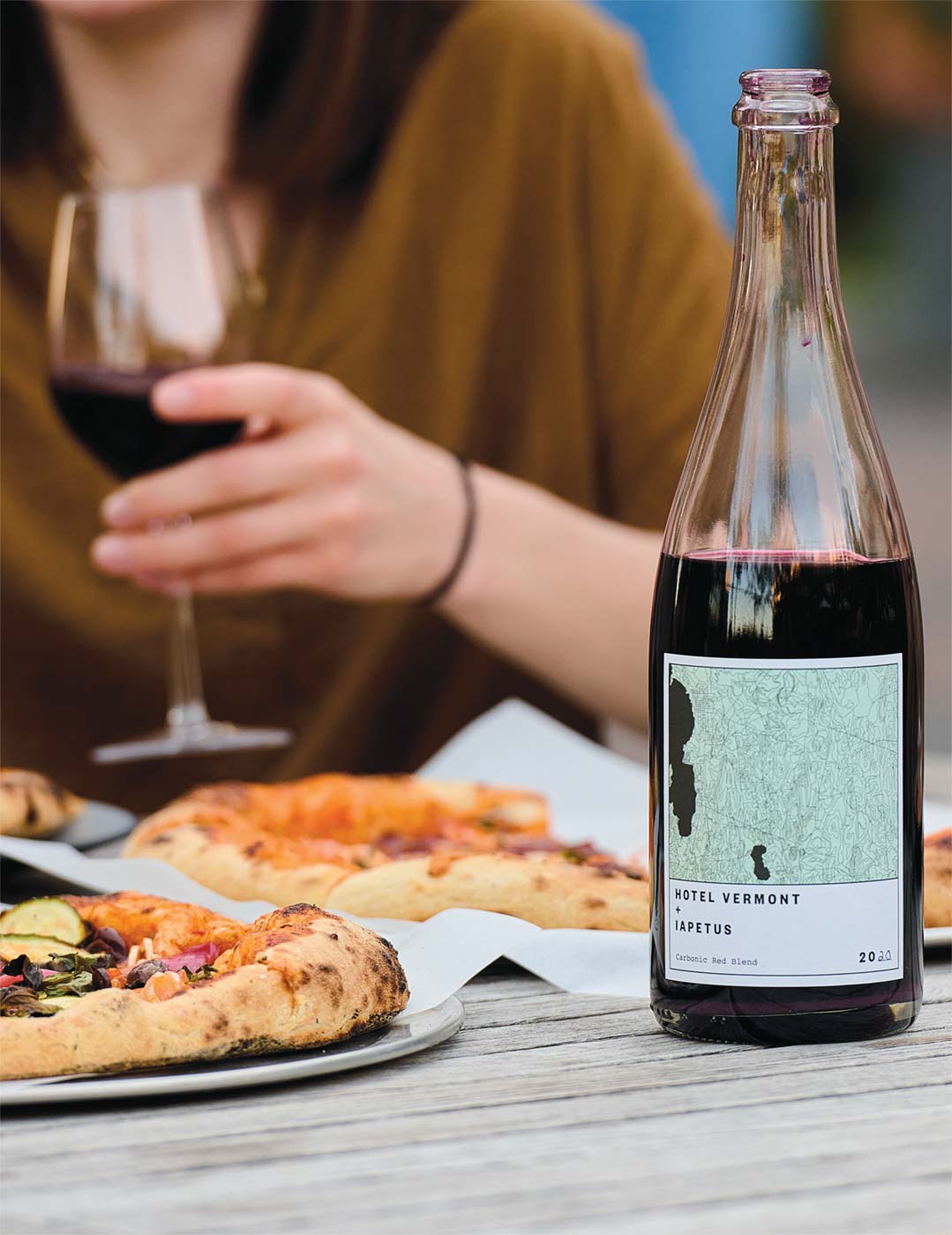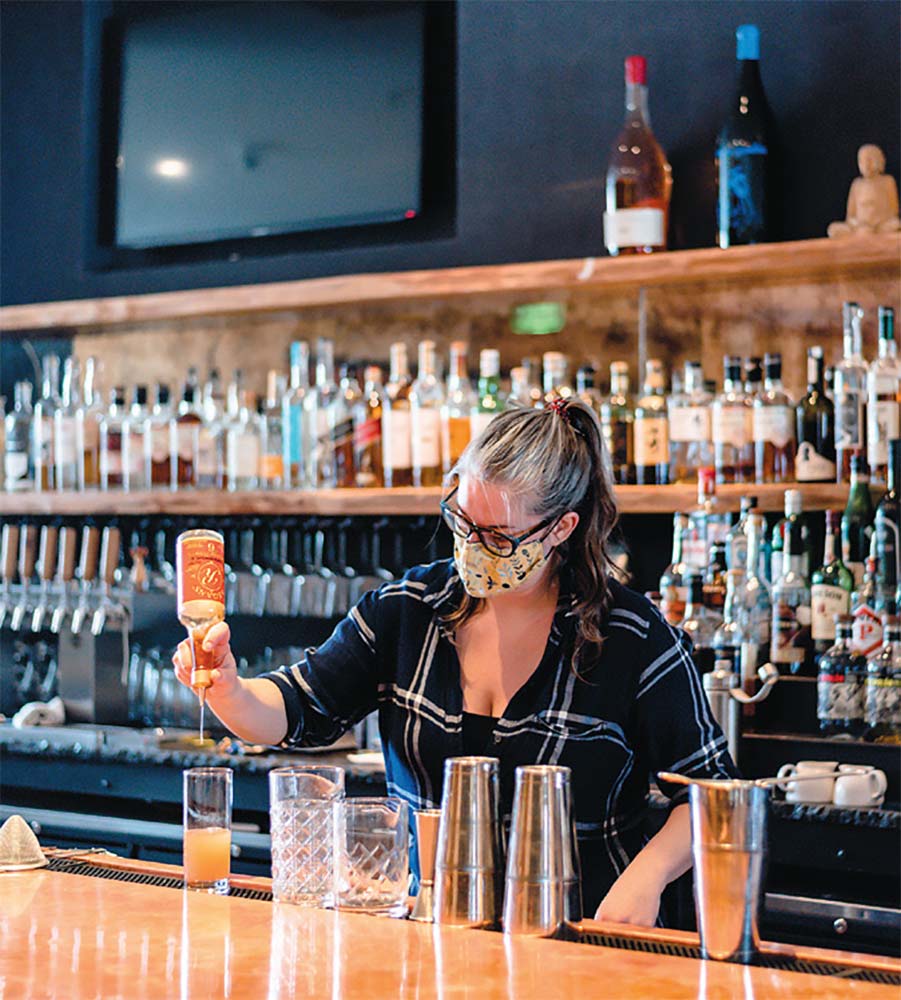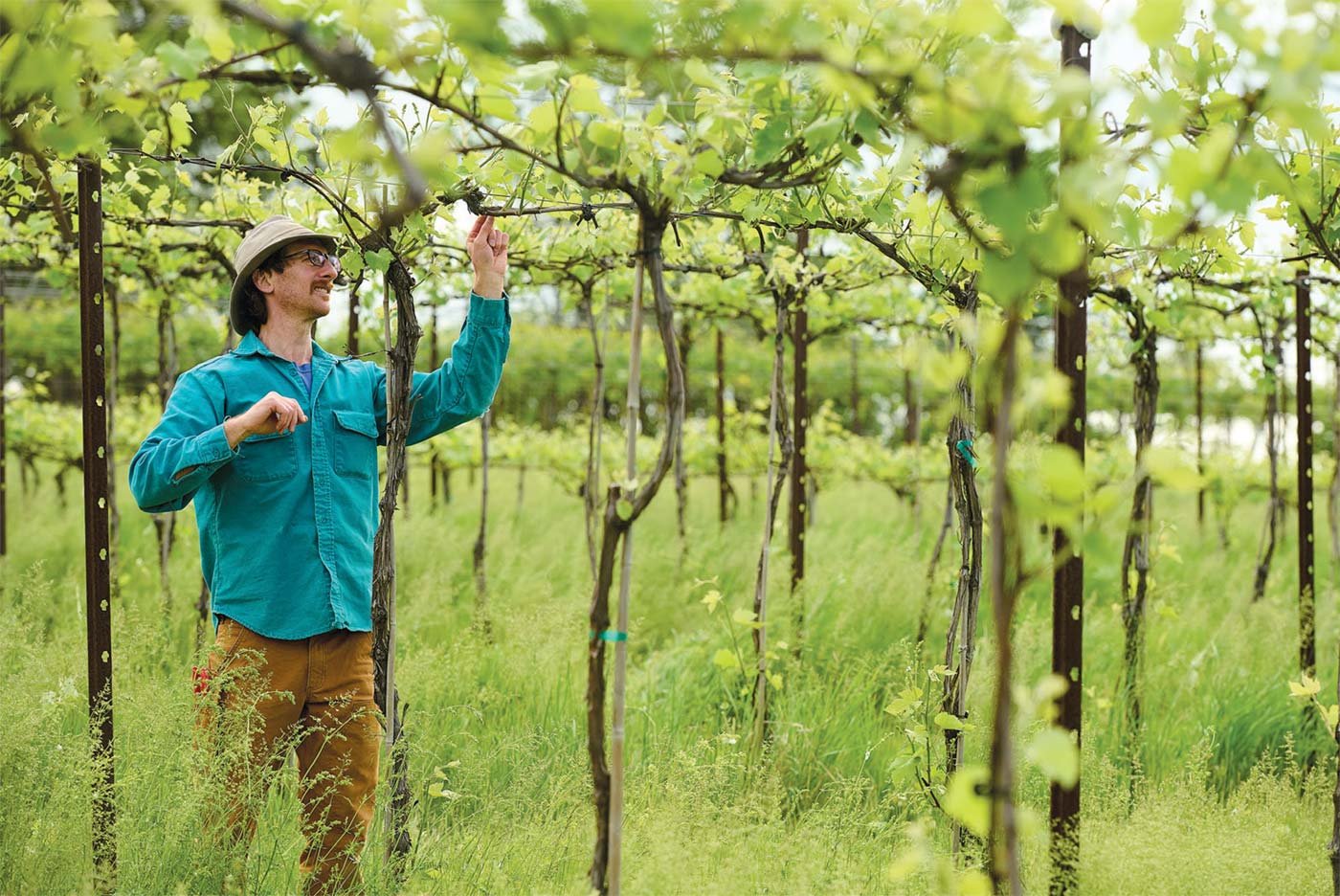Hotel Vermont x Iapetus


Katie Wise pouring at Juniper (photo: Isora Lithgow)
At Hotel Vermont, the lobby restaurant, Juniper, is its calling card. Upon arriving for a stay, hotel guests delay check-in in favor of allowing the professional bartenders to craft a specialty cocktail or build a pint of beer. The live-edge wood shelf above the bar showcases the commitment to high-quality Vermont spirit makers and distillers, and their bottle, can, and draft offerings reflect some of the most sought-after and exceptional beers on the planet. But what if we told you that Vermont wine competes with the most delicious beverages on the menu? Or that Hotel Vermont has collaborated with local winemakers to make its own red wine?
Vermont wine has never enjoyed the patronage of its malty counterpart. Our climate presents terrible challenges to growing grapes. With a deep frost through winter, a short growing season, and inclement weather, many of the traditional varietals would never succeed. However, Vermont seldom tries to impersonate other states, particularly in agriculture, so why would Vermont winemakers look to produce California chardonnay or cabernet sauvignon? Instead, Vermont winemakers, led by Ken Albert of Shelburne Vineyard, have pioneered cold-hardy hybrid varietals since the late 1990s. Grapes such as Louise Swenson and La Crescent (both white) and the indomitable Marquette (red) are often considered the second-class citizens of the wine world. While they are outlawed by the AOC in France, they are making a name for themselves in cold climates such as Vermont. Ken, head winegrower Ethan Joseph, and the team at Shelburne Vineyard—
CJ Buzzy, Josh Stecker, and Tyler Mackelvey—are the farmers and cellar men behind the exciting collaboration with Hotel Vermont.
The new age of Vermont wine cannot be told without the story of Deirdre Heekin and Caleb Barber of La Garagista in Barnard. La Garagista, “the garage winery,” has championed the use of these hybrid grapes, which bring a characteristic similar to many of the grapes grown in the alpine regions of Europe. These grapes are hardy with thick skin and ample acidity, often perfect for sparkling white wine or light-bodied red wine. La Garagista planted the flag for Vermont wine, promoting a “hands-off method” by allowing the grapes to grow naturally in the vineyard with other animals, insects, and flora and by doing less in the cellar, meaning making wine with no controlled yeast and little to no sulfur. The method produced wine with a sense of place and identity never before recognized in Vermont. For the past seven years, those “in the know” have considered the work of Deirdre and Caleb to be some of the most exciting and delicious in the domestic wine world. It is now a reality that in small boutique circles of New York, Los Angeles, and London you can find wines made from hybrid grapes here in Vermont.
La Garagista did more than put Vermont wine on the national radar. It helped inspire the next wave of Vermont vignerons (people who grow and make their own wine), including neighbors and brothers Jonny and Christopher Piana of Fable Farm Fermentory, who make apple and grape wines, along with Ethan Joseph. Ethan started as Ken’s apprentice in 2008 before eventually becoming the head winegrower.
Inspired by the movement of natural wine, Ethan launched a second label under Shelburne Vineyard in 2016 called Iapetus. It is wine made with as much focus on tending to the vineyard as to the cellar. Fermentation is spontaneous and the result is an expression with a true sense of place.
Hotel Vermont has always been a fan of Ethan’s work. From the first vintage, Iapetus was special. Its lineup includes rich whites with an oak influence made from the Louise Swenson grape, some of their favorite medium-bodied, food-friendly reds, and naturally sparkling pét-nats for the sour-beer drinkers. From day one Juniper was on board with Iapetus and started a crusade to expose their guests to Vermont wine. As the relationship grew from shared interests and geography, it became obvious that a collaboration was in place.

Head winegrower Ethan Joseph picking grapes
Iapetus is wine made with as much focus on tending to the vineyard as to the cellar.
As with many participants of the natural wine world, Hotel Vermont is smitten with the light-bodied red wines of southern Burgundy, particularly the Beaujolais. Their juicy red wines with supple tannins can be enjoyed young and chilled. This style of wine is fun, not to be taken too seriously. In France, it is referred to as “Glou Glou,” which reflects the sound made while consuming large sips. As it turned out, the folks at Iapetus also like this style. The two businesses decided to team up and set out to make some Vermont Glou Glou.
The backbone of this project, Hotel Vermont x Iapetus, was the fierce red grape Marquette. With its high levels of acidity and fruit-forwardness, this grape is the last to be harvested in order for the sugar to develop and the acidity to balance out. This often results in a wine north of 14 percent. Their goal was Marquette, but leaner, juicier, and more Glou Glou.
In October 2019, a small team from Hotel Vermont helped harvest Marquette from McCabe’s Brook Vineyard in Shelburne. In April 2020, the team blended a finished wine made from a field blend of red grapes, primarily Marquette that had gone through carbonic maceration to achieve levity with a touch of white wine from the Louise Swenson grape, bringing lightness to the blend. The result was exactly what the two had hoped for: an easy-drinking, refreshing red that is served with a light chill and can be enjoyed at the dinner table or all alone.
History, water, and geology all provided inspiration for the label. Iapetus is a reference to the ancient sea that once covered the Champlain Valley. Local artist and one-time Hotel Vermont team member Mackenzie Murray designed a label with a geographic snapshot of the Champlain Valley, showing both the location of Hotel Vermont and Shelburne Vineyard. The pale green landscape has topographic lines that flow like water. The soft green label is adhered to a clear bottle, allowing the garnet color of the wine to provide a beautiful backdrop.

Hotel Vermont’s welcoming lobby (photo: Jim Westpahlen)
Iapetus is a reference to the ancient sea that once covered the Champlain Valley.
In June 2020, the first-ever bottle of Hotel Vermont x Iapetus from the previous vintage was released. The timing was challenging given the global health climate. There was a concern that they would not be able to share enough of the wine to produce a 2020 vintage. The concern turned out to be unfounded, as guests found a light-bodied, local red wine the perfect pairing for the hotel’s outdoor wood-fired pizza restaurant, Brick. Often there is a hurdle to serving Vermont wine—guests are skeptical—but Hotel Vermont x Iapetus has proven the gateway juice for so many.
For their second vintage this year, they are thrilled to introduce two new packages, a 375-milliliter bottle for a single serving or a 1.5 liter bottle for a party. The wine is only available at Hotel Vermont. It’s their belief that this wine is for everyone—the natural wine geeks, those interested in tradition and balance, and those dubious about domestic wine grown in a cold climate—who needs a reason to be proven wrong. Hotel Vermont x Iapetus is an extension of its beliefs, a wine built of collaboration, shared values, and love of Vermont. A natural fit.




